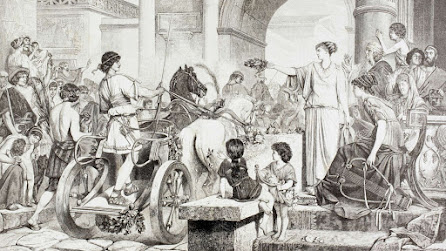How Olympics Became a Spectacle of Unity

The Modern Olympic Games or Olympics, every two years alternating between winter or summer games, athletes from all around the globe assemble together to compete against each other. Olympics, the most popular international sporting events were not always the same as now. Olympics as we now see it wildly differs from the original ancient games.
The Ancient Olympics was actually a pagan religious festival held every four years at the Sanctuary of Zeus (Temple of Zeus) in Olympia, Greece. Athletes competed against each other to honour Zeus, the mythical King of all ancient Greek Gods. The first Olympics is considered to be held around 776 BCE. As the popularity grew, almost all the city-states in Greece participated in the Olympics. In the first few Olympics, footrace was the only sporting event. Athletes would run a stadion (Greek Unit of distance) which is 200 steps long. When the Romans conquered the Greeks, they pilfered the word Stadion called the distance a Stadium, and from Latin, we got the word Stadium for the sports ground where the sporting events happen with tiers of seating for the spectators. After a few Olympic games, new games emerged such as the pentathlon, horse racing, javelin throw, wrestling, et cetera. Just like our modern Olympics, The Ancient Olympics were a cultural unifier, a peaceful collaboration where enemies and friends competed against each other who may still be at war with each other.
Olympia Stadion
During the Ancient Games, a truce is declared which is an agreement between the enemy states to stop the war and fight for the duration till the end of the games, i.e. a ceasefire. This allowed athletes and religious pilgrims from various parts of the city-states of Greece to travel freely to reach Olympia. Though it seems like everything was peaceful during the games, the games themselves were brutally violent. Deaths in the competitions were a regular occurrence. For instance, in wrestling, the opponent should die or say I surrender by raising his finger for the other to win the game. The Ancient Olympics were stained with blood. For some reason, the Greeks and Romans who conquered later loved the violent nature of the Games and it attracted a lot more audience. Even after conquering the Greeks, Romans kept the Olympics going, and they even increased the violent nature of the games.
The Games were only allowed for men and not for women. Other smaller-scale games were conducted separately for women which were to honour Zeus's consort (wife) Hera. In both the men's and women's games, alongside the sporting events, sacrificial rituals were also conducted, honouring Zeus and Pelops. Pelops was the mythical divine king of Olympia.
The Games were held every four years, and this four-year era is called an Olympiad, which was used by Greeks as their unit of time measurement. The Olympic Games were a part of a cycle known as the Panhellenic Games, which includes the Pythian Games, Isthmian Games and Nemean Games.
The Ancient Olympics reached its highest popularity in the fifth and sixth centuries BCE. All was good until a small religion called Christianity popped up and spread rapidly throughout Europe. In 380 CE, Christianity was declared as the Roman State's official religion and in 393 CE the Roman emperor Theodosius I decreed to eliminate all pagan cults and practices and his successor Theodosius II ordered to destroy all Greek temples. Being a pagan religious festival, The Olympics also had to meet its unceremonious end.
1896 Olympics Opening Ceremony
Until the 1820s, the Olympics was in the graves to be revived soon. In 1821, interest in reviving the Games emerged among the greeks with the Greek War of Independence from the Ottoman Empire. Finally, in 1870, The Olympics was revived and held in Athens, Greece, another game was conducted in 1875. But these weren't the major revivals that lead to the beginning of the Modern Olympics. In 1890, International Olympic Committee (IOC) was formed, after so much bureaucracy, with new rules and changes, it decided to hold the first modern Olympic Games in Athens, Greece in 1896. The 1896 Games were a success in which 14 nations and 241 athletes competed. From then, with various changes, adaptations and struggles through two world wars, and the recent pandemic, the Olympics continues its journey.


